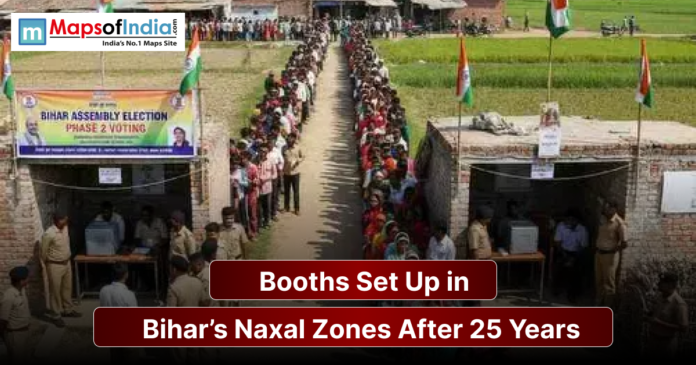In a historical event during the current Bihar Assembly election, polling booths in 14 villages of three districts in the state were set up in the last 25 years, which is a big milestone in regaining democracy in areas that were previously controlled by the influence of the Naxals. Families of ex-Naxalites also vote, and this signifies restoration of peace and trust towards the democratic process.
The officials of the Election Commission claimed that the polling booths in Jamui, Munger, and Lakhisarai districts were re-established, which had been declared Naxal-infested previously, and had not been experiencing voting in decades in fears of security and militant governance. In some of these villages, the polling stations had been closed since the late 1990s because of the frequent cases of violence, and ambushes made the whole process unsafe both to the election officials and to the voters.
The rebuilding of polling points and the high participation of the villagers, including families of those who were previously related to Naxal groups, was one of the most impressive changes. Most of the voters also took pride in their ability to vote locally and not have to travel long distances to cast their votes in the neighbouring towns. It was an emotionally charged election for old voters who had lived for so long in fear of being excluded.
The authorities assured that there were tight security controls that were put in place so that polling could proceed peacefully. The use of central paramilitary forces was also implemented, as well as drone surveillance within sensitive regions. Polling was conducted without violence or disturbance, even after there were apprehensions. The Election Commission termed it a huge victory for the law enforcement agencies as well as the democratic process.
In Munger, one of the worst-hit areas, the villagers who had been the eyewitnesses to a 2005 Naxal assault that claimed seven policemen, reported to vote in large numbers. The Chormara village in Jamui, the people there rejoiced after more than twenty years when a polling station was established and dubbed it a festival of democracy.
According to the authorities, the fact that the families of Naxalites participated in the elections is a symbolic triumph of peace programs being done by the state and central governments. During the years, the high levels of security activities, the enhanced road networks and rural development projects have diluted the presence of extremists in these areas.
This election has thus surpassed the political event; it has become a symbol of Bihar, the state that has come out of conflict and become a state of confidence. The fact that the villagers lined up to vote in the areas that were quite out of reach a few years ago is a glaring example of the fact that democracy, despite its lateness, can be reestablished even in the most remote corners of the state.










